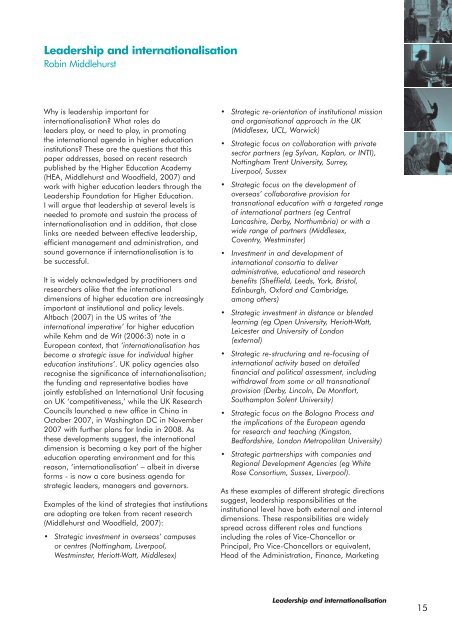HE senior mgrs_Apr18 - Bournemouth University
HE senior mgrs_Apr18 - Bournemouth University
HE senior mgrs_Apr18 - Bournemouth University
Create successful ePaper yourself
Turn your PDF publications into a flip-book with our unique Google optimized e-Paper software.
Leadership and internationalisationRobin MiddlehurstWhy is leadership important forinternationalisation? What roles doleaders play, or need to play, in promotingthe international agenda in higher educationinstitutions? These are the questions that thispaper addresses, based on recent researchpublished by the Higher Education Academy(<strong>HE</strong>A, Middlehurst and Woodfield, 2007) andwork with higher education leaders through theLeadership Foundation for Higher Education.I will argue that leadership at several levels isneeded to promote and sustain the process ofinternationalisation and in addition, that closelinks are needed between effective leadership,efficient management and administration, andsound governance if internationalisation is tobe successful.It is widely acknowledged by practitioners andresearchers alike that the internationaldimensions of higher education are increasinglyimportant at institutional and policy levels.Altbach (2007) in the US writes of ‘theinternational imperative’ for higher educationwhile Kehm and de Wit (2006:3) note in aEuropean context, that ‘internationalisation hasbecome a strategic issue for individual highereducation institutions’. UK policy agencies alsorecognise the significance of internationalisation;the funding and representative bodies havejointly established an International Unit focusingon UK ‘competitiveness,’ while the UK ResearchCouncils launched a new office in China inOctober 2007, in Washington DC in November2007 with further plans for India in 2008. Asthese developments suggest, the internationaldimension is becoming a key part of the highereducation operating environment and for thisreason, ‘internationalisation’ – albeit in diverseforms - is now a core business agenda forstrategic leaders, managers and governors.Examples of the kind of strategies that institutionsare adopting are taken from recent research(Middlehurst and Woodfield, 2007):• Strategic investment in overseas’ campusesor centres (Nottingham, Liverpool,Westminster, Heriott-Watt, Middlesex)• Strategic re-orientation of institutional missionand organisational approach in the UK(Middlesex, UCL, Warwick)• Strategic focus on collaboration with privatesector partners (eg Sylvan, Kaplan, or INTI),Nottingham Trent <strong>University</strong>, Surrey,Liverpool, Sussex• Strategic focus on the development ofoverseas’ collaborative provision fortransnational education with a targeted rangeof international partners (eg CentralLancashire, Derby, Northumbria) or with awide range of partners (Middlesex,Coventry, Westminster)• Investment in and development ofinternational consortia to deliveradministrative, educational and researchbenefits (Sheffield, Leeds, York, Bristol,Edinburgh, Oxford and Cambridge,among others)• Strategic investment in distance or blendedlearning (eg Open <strong>University</strong>, Heriott-Watt,Leicester and <strong>University</strong> of London(external)• Strategic re-structuring and re-focusing ofinternational activity based on detailedfinancial and political assessment, includingwithdrawal from some or all transnationalprovision (Derby, Lincoln, De Montfort,Southampton Solent <strong>University</strong>)• Strategic focus on the Bologna Process andthe implications of the European agendafor research and teaching (Kingston,Bedfordshire, London Metropolitan <strong>University</strong>)• Strategic partnerships with companies andRegional Development Agencies (eg WhiteRose Consortium, Sussex, Liverpool).As these examples of different strategic directionssuggest, leadership responsibilities at theinstitutional level have both external and internaldimensions. These responsibilities are widelyspread across different roles and functionsincluding the roles of Vice-Chancellor orPrincipal, Pro Vice-Chancellors or equivalent,Head of the Administration, Finance, MarketingLeadership and internationalisation15





![[2012] UKUT 399 (TCC)](https://img.yumpu.com/51352289/1/184x260/2012-ukut-399-tcc.jpg?quality=85)




![Neutral Citation Number: [2009] EWHC 3198 (Ch) Case No: CH ...](https://img.yumpu.com/50120201/1/184x260/neutral-citation-number-2009-ewhc-3198-ch-case-no-ch-.jpg?quality=85)





